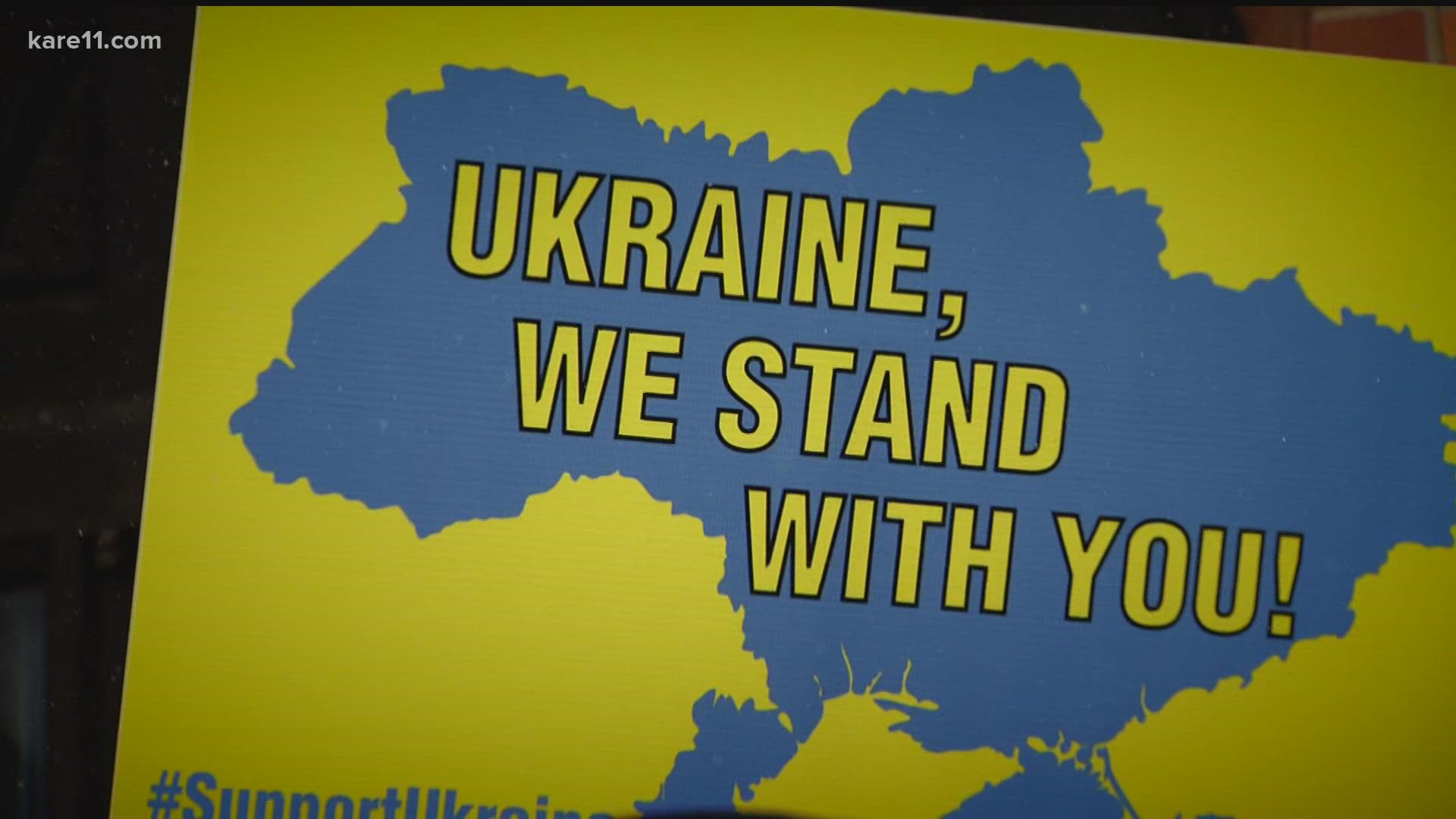MINNEAPOLIS — Stephen Vitvitsky has closely monitored tensions in his family's home country of Ukraine over the past several weeks, as neighboring Russia mobilized more than 100,000 troops on the border.
Now, fears of an invasion have become a reality.
"You can't look away," Vitvitsky said, standing on the doorstep of St. Constantine Ukrainian Catholic Church in Northeast Minneapolis ahead of a solidarity rally Thursday. "It's deeply traumatizing."
Vitvitsky, a second generation Ukrainian-American with family in the western Ukrainian cities of Khmelnytsky and Lviv, said his relatives are safe.
But they're nervous.
"I'd say the overwhelming sentiment is one of massive anxiety. People are terrified and rightly so," Vitvitsky said. "They're being invaded. Russian bombs are raining down all around Ukraine, from the east to the west. This is not a minor incursion. This is not a small-scale invasion. This is affecting every part of Ukraine and every Ukrainian."
As Vitvitsky explains, Ukrainians have long been accustomed to some degree of Russian threat, ever since Ukraine declared independence in 1991 following the collapse of the Soviet Union. In 2014, tensions simmered further when the Ukrainian people overthrew pro-Russian president Viktor Yanukovych, pushing an angered Putin to annex Crimea and support a separatist war in eastern Ukraine.
Over the past eight years, the ongoing conflict has pitted a flawed but emerging democracy in Ukraine versus an autocratic Russian regime under Putin, who strongly opposes Ukraine's efforts to forment closer ties with Western democracies. Ukraine is not currently a member of the North Atlantic Treaty Organization (NATO) or the European Union, and Russia wants it to stay that way.
Although the long-running war in eastern Ukraine has made major headlines in the United States -- and was the backdrop for the first impeachment of former President Donald Trump -- this latest escalation may be confusing to many Americans.
Andrew Latham, a professor of international relations at Macalester College, thinks Putin might have decided it's "now or never" to invade neighboring Ukraine.
"I think he senses that Russia's position is getting weaker. Ukraine is getting stronger, and he sees it slipping into the West," Latham said in an interview with KARE 11. "For whatever reason -- I think he's wrong -- but he thinks that's a threat."
On Thursday, Latham published an opinion piece for The Hill, "shattering the myth of Vladimir Putin as a strategic genius." The professor argues that Putin seems to have backed himself into a corner by mobilizing so many troops and military equipment on the border, and failed to provide himself with an "off-ramp" after NATO allies refused to accept his demands that Ukraine never be admitted to the post-World War II alliance.
"If the idea was to weaken NATO, it's totally failed. If the idea was to neutralize Ukraine, well, let's wait and see," Latham said. "There's also the possibility he might be bogged down in an Afghanistan-style, kind of long, protracted, guerilla war, and that was one of the things that brought the Soviet Union down."
Putin's next steps are unknown.
But at Thursday's solidarity rally for Ukraine in northeast Minneapolis, Ukrainian-Americans denounced his actions and called the aggression totally unwarranted. Stephen Vitvitsky, the second generation Ukrainian-American who has lived in Minnesota for about two decades, said he was particularly offended by Putin's characterization of Ukraine as "entirely created by Russia."
"His claims are surreal. His claims are completely insane and unhinged. This notion that Ukraine somehow doesn't exist or doesn't deserve to exist... Ukraine exists. Everyone can see Ukraine," Vitvitsky said. "They're just completely nuts. He's nuts."
Watch more local news:
Watch the latest local news from the Twin Cities in our YouTube playlist:

